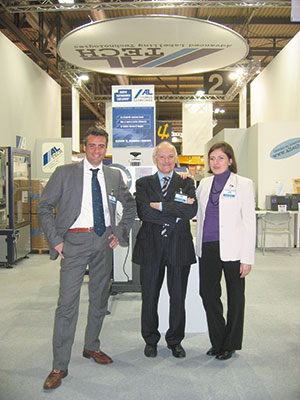Feet on the ground, aiming high
Since 1991, Altech has been building labeling machines and automatic identification systems for all consumer goods sectors. A very Italian firm, but one with a global outlook, it has always been known for its vocation for export, which over the years has led it to establish a presence on every continent.
Altech’s strong and steady growth has been driven by a business strategy that combines realism and innovation, with clear and coherent ideas on where to go next. Founder and president Piero Salvini and aboveall his son Paolo, who has been actively involved in the firm’s commercial strategy since the beginning, participating with enthusiasm and spirit of initiative in the concern’s management, talked to us about them.
When you started designing and building machines, and on which competitive factors did you choose to focus?
Labeling is constantly being tasked with new functions, partly in response to changing national and international laws. In this sprawling, diverse and evolving market, we have always worked on two fronts. On one hand, we have offered reliable, quality solutions built using the finest materials, studied down to the smallest detail, solutions that are rugged, ergonomic and able to guarantee high performance and consistent results over time. On the other hand, beyond merely supplying machines, we consider it fundamental that we also support our customers with a qualified consulting service that begins with listening to their requests in order offer the most suitable solutions, which can be developed ad hoc as the need arises. Every user knows their own needs, but when it comes to labeling, guidance is necessary in order to identify the optimal configuration for a system, thereby reaching the best production efficiency, combining performance and usability.

How is this dedication reflected in the technologies you offer?
We work tirelessly to continuously perfect a wide range of standard heads, which can be combined and integrated as needed to create simple or complex systems that respond to the most disparate application requirements: from primary labeling (decorative and informative) of products of various styles and formats, to anti-tampering labels on caps and covers, to identification of boxes, bundles and pallets using print & apply systems in real-time.
Configurability and modularity are principles that complement the standardization of basic heads by making it possible to create reliable, personalized systems that can be adapted to specific labeling needs. Standard labeling heads and systems account for two thirds of our overall turnover, while the remaining 30% comes from providing print & apply solutions.

What are your main target sectors?
Our offer is generalized. From food to cosmetics/pharmaceuticals & personal care, from chemicals to home care, Altech solutions are used in virtually every sector to label primary and secondary packaging, or products themselves (for example cooking utensils and metal tools). Furthermore, for end-of-line labeling, we offer print & apply systems with integrated printers and/or coders by Sato, a market leader for which we have been the exclusive distributor for years in privileged partnership relations, even though, upon request, we also integrate our solutions with the systems of other compatible brands acquired directly by the customer.
What trends have you identified in user requests? In terms of technology, in what direction are your solutions evolving?
Our core business remains focused on the supply of linear self-adhesive labeling systems for all packaging types (excepting special formats or completely non-standard ones), with speeds ranging from 1,000 to 18,000 pieces per hour. This is a very specific market, but one with outstanding potential, so we will continue to focus our efforts here. More than the demand to enhance speed, the main expectations of our customers have to do with ruggedness, reliability and precision-functioning over time, as well as easy format changeover and a clear and easy-to-use human-machine interface. To this end, we have already introduced some important improvements, such as a 7-color 7’’ touchscreen panel, with clearly legible icons, featuring a mask into which the user can enter parameters with which to adjust the process. Generally speaking, it’s important to note that what were once considered optionals are now standard features. This is why our primary objective is to standardize the optionals and additional functionalities that are most in demand, making them available at no additional cost for our entire range of labeling heads. This is the case, for example, of the option of inclining the machine in order to adjust label alignment, as well as integration of position numbering, which makes it possible to speed up format changeover. Small changes like these are warmly welcomed by users because they enhance the machine’s operation, often making the difference in terms of competitiveness.
The hyper-depreciation measures enacted by Minister Calenda in order to promote the adoption of industry 4.0 equipment have reinvigorated the manufacturing sector, and thus sales of smart systems and machinery. How have these incentives influenced your market?
There has certainly been a boost, but for the moment it remains difficult to measure. As far as regards labeling technologies, it is important to note that 4.0 functionalities, in the name of interfacing with the user’s IT system, require the presence of PLCs, operator panels, Ethernet cards and the necessary programming for gathering and exchanging process data. On our most sophisticated and complex systems, we included these technologies by default even before the government measures were implemented. Nonetheless, we have also integrated 4.0 elements because the customer specifically requested it for special jobs for which we provided personalized planning.
It’s clear, however, that equipping single heads or simple systems with 4.0 functionality, for use in small-medium processes, would make no sense. The costs would be prohibitive in relation to the price of the machine and negligible operational advantages.
Who is your client base? What’s your target market?
Our business has always been export-oriented. Currently, 80% of Altech machines are sold abroad, but in reality this percentage is closer to 90% when one considers that domestically, excluding a tiny number of end users, we mostly supply OEMs that integrate our heads with packaging lines for export.
As for the global market, in addition to three subsidiaries in Argentina, the USA and the UK, a major strength of ours is a network of distributors that offer Altech solutions on every continent. With 80 authorized dealers in over 50 countries, we have managed to establish and consolidate over the years a relationship built on trust and reciprocal advantage. Our distributors operate not only as commercial intermediaries, but also work to collect and pass on to us the requests of the market. Altech’s technical division studies each order to offer the best possible machine configuration, providing knowhow accrued over the course of 25 years working in the sector, while the dealership provides service on the ground, from installation to testing and post-sales assistance. This now tested business model saves us from a number of burdens that would otherwise prove economically and logistically unsustainable, because, on average, the product type supplied has a final cost that in many cases would not allow covering delivery costs or justify paying for a local presence.
A clear market vision, consolidated strategies, recognized quality in your offer - this should all add up to further growth... Any numbers on that?
We currently employ 50 people. Producing over 1000 labelers a year, Altech is set to exceed 12 million euro in turnover, with a strong profit margin.
We like to think of ourselves as an old-fashioned business: profits are important to use, but we consider it fundamental that the business is able to finance itself. Today, as in the past, our main goal is not to accumulate personal wealth but to reinvest in the growth of the business, which in order to be truly solid, must be able to stand on its own two feet, without relying on external sources of funding.

The passion for business as a family legacy
A confluence of fortuitous events has marked the business career of Piero Salvini, like his being hired by the labeling division of Fima in 1981, right when it became a legal requirement to affix a die-cut to pharmaceutical packaging, making it possible for the concern to triple its sales, thus sealing an unexpected personal success. Later on he was chosen to direct a transportation company («excellent practice for applying marketing principles in a sector I was not acquainted with» remarks the Altech president with a smile) and shortly after that, to work for a great distributor of electrical components. Returning to the world of labeling, Salvini decided with determination to found Altech along with some partners.
The firm officially came into being on 16 September 1991 - he taking over all the shares some years on.
Doing business proved a contagious family passion when Piero’s son Paolo, newly returned from military service and who had just enrolled in university, decided to take the reins of the firm’s sales, making up in enthusiasm what he lacked in experience, and in any case never failing to recognize the technical and managerial competences which would enable his father to guide the company’s success.
«The presence of Paolo and my daughter Laura (who deals with Finance and Human resources, Ed.) has been encouraging, and their decision to follow in my footsteps has convinced me to undertake an adventure of which I am proud after more than a quarter century» relates Salvini.

















